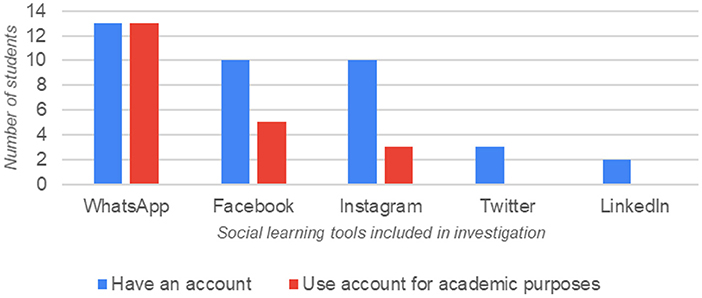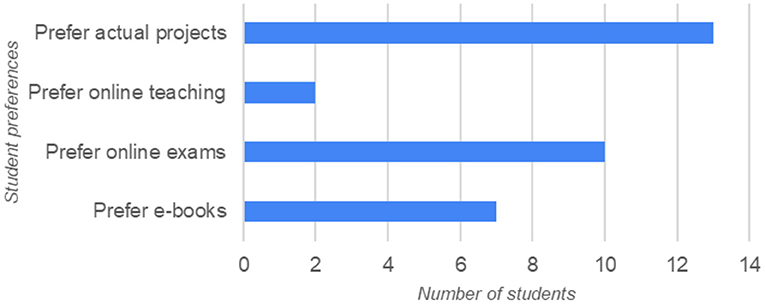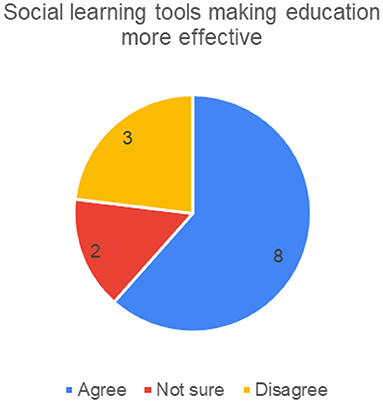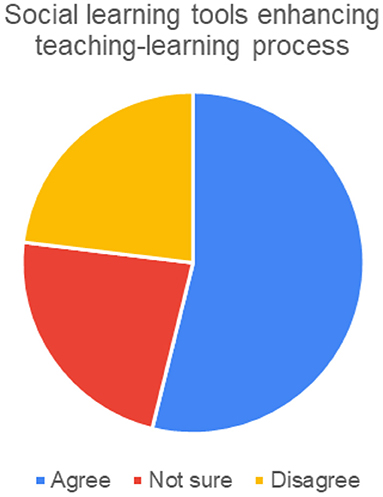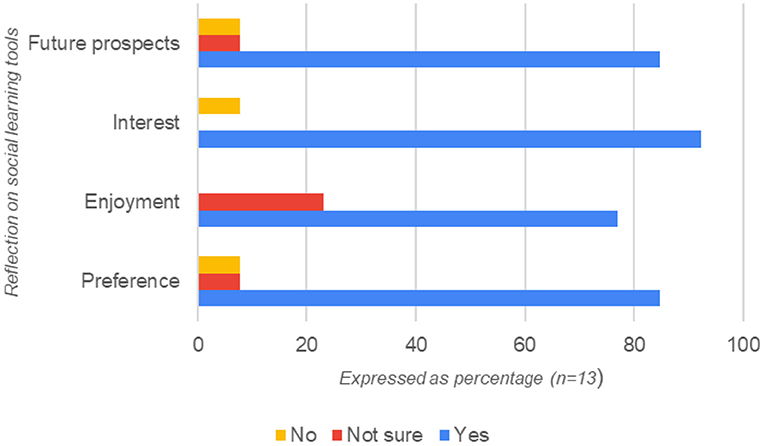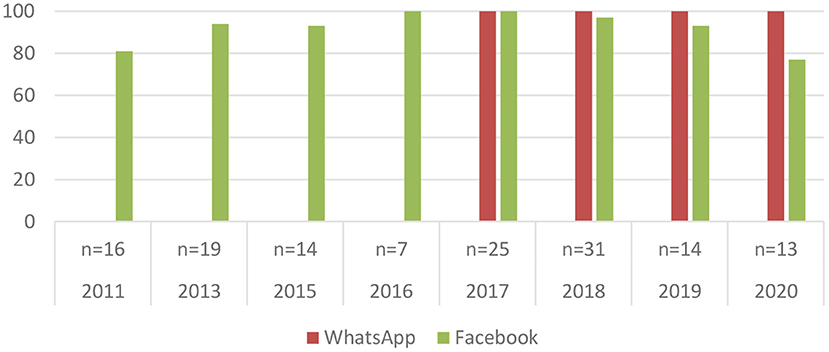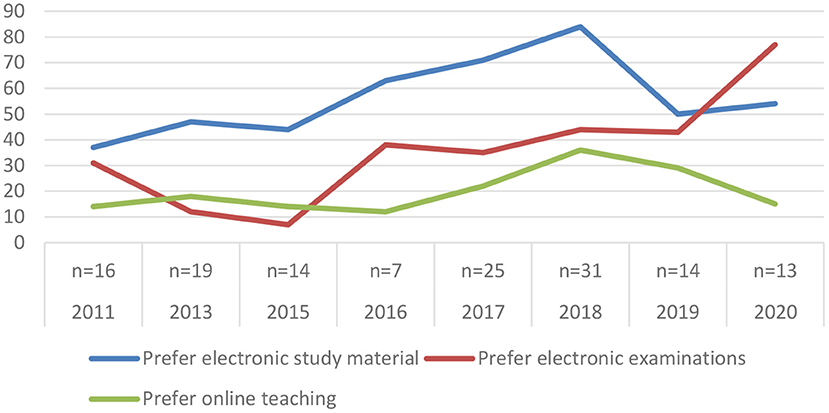- 1Unit for Environmental Sciences and Management, North-West University, Potchefstroom, South Africa
- 2Faculty of Design, Architecture and Building, University of Technology Sydney, Broadway, NSW, Australia
Limited research has considered social learning tools and preferences of the Generation Z learner from a higher educational perspective. This research is based on the educational theories of constructivism and social learning, in attempt to reflect on social learning tools employed in a third year Urban and Regional Planning module at the North-West University (South Africa). The empirical investigation was based on the reflections from Generation Z learners who were introduced to a range of social media tools. The paper aimed to investigate if social learning tools can positively impact the learner experience in the contemporary classroom based on longitudinal data. It identified the preferences of the Generation Z learners in terms of social media tools, and the trends thereof, during a 10-year period (2011–2020). Finally, the paper drew on the perspective of the educator, in reflecting on the challenges, but also scope, to include social learning tools as part of higher education teaching-learning.
Introduction on Social Learning Theory and Supportive Social Learning Tools
The notion of sustainability facing our contemporary society calls upon pedagogies and forms of learning that enable leaners to deal with accelerating change, increasing complexity, contested knowledge claims, and inevitable uncertainty (Lotz-Sisitka et al., 2015). The social learning theory (Bandura, 1977) refers to learning through social media settings, focusing on observation as an important aspect of learning, that model the behavior of learners accordingly. Social learning theory is a theory of learning process and social behavior which proposes that new behavior can be acquired by observing and imitating others. It states that learning is a cognitive process that takes place in a social context and can occur purely through observation or direct instruction, even in the absence of motor reproduction or direct reinforcement (Smith, 2012). Social learning theory integrated behavioral and cognitive theories of learning in order to provide a comprehensive model that could account for the wide range of learning experiences that occur in the real world. The theory departs from the understanding that learning is not purely behavioral but rather a cognitive process that takes place in a social context. In this sense learning involves observation, extraction of information from those observations, and making decisions about the performance of the behavior (observational learning or modeling). The learner is not a passive recipient of information. Cognition, environment, and behavior all mutually influence each other to enhance the learning process (Smith and Smith, 2008). Specific social learning tools support the social learning theory, as accordingly explained. Social learning tools are tools used for pedagogical and andragogical purposes that utilize social software and/or social media in order to facilitate learning through interactions between individuals and systems (Smith, 2012). Joosten (2012) defines social media as technological systems related to collaboration and community, thus also including social networking sites. The idea of setting up “social learning tools” is to make education more effective, enhance the teaching-learning process, but also to make education more widespread in terms of communication and collaboration with the broader public (Smith, 2012). Social learning tools allow an interaction between users and/or the software which can bring a different aspect to learning. Social learning tools may mediate in formal or informal learning environments to help create connections between learners, instructors, and information. These connections form dynamic knowledge networks. Social learning tools bring a different approach to the traditional way of learning which affects the learner and his/her support circle. It creates a learning environment more truthful to today's society. Technology employed in the social learning tools allows physical and cognitive learning through the interactions between the people who use the tool and interactions with the software. Following the research of Albert Bandura, the advent of social media has changed the platform for social interaction and human experience. Enhanced learner engagement and learning is now possible via a social media context (Deaton, 2015) and conform to the objectives of an effective learning environment that seeks to combine theory and practice in dynamic ways (Gurran et al., 2008). In an Educational context, social media challenges traditional assumptions that have long characterized the learning experience of all learners (Pavlik, 2015). Gone are the days of one-way communication akin to broadcasting (Vickers et al., 2015), for in the age of social media, communication is a two-way, three-way, and hundred-way tool that is interactive, immersive, and omnipresent. At any level and in any content area, social media can be used to enhance learning, and it can be used to encourage learners to think critically about the technology pervading their worlds (Deaton, 2015). Social media tools also provide learners with new opportunities to become independent in their study and research (Liu Y., 2010). Social media platforms, including WhatsApp, Instagram, Twitter, LinkedIn and Facebook were specifically considered in this research, as part of the investigation into the effectiveness of such social learning tools and the Generation Z learner.
Social Learning Tools and The Generation Z Learner
There is a rise of a new generation that is “location-aware” and speaks a “technological-language,” also called Generation Z (Cilliers, 2017). This generation Z is the new cohort of leaners that now fill our classrooms and demand a different approach to teaching-learning, encapsulated by technology advances to provide instant information in visual format, in keeping with the virtual world they have been familiarized with since birth (Rothman, 2016; Cilliers, 2017). Generation Z, aged 15–20 years, are considered the “realistic,” “highly connected” and “digital natives” generation. Early indications are that they are increasingly self-aware, self-reliant, innovative, and goal-oriented. One key characteristic is that this generation does not know or remember a time before social media, and as a result, they tend to live their lives “online,” having profound implications for everything from their relationships and how they learn to virtual reality training and problem-solving (Bozeman, 2017).
For Generation Z, it is less about “communication,” and more about “interaction” (Du Plessis, 2011). The educator stands central to enabling a classroom environment conducive to collaboration, critical thinking and co-creation (Stern, 2014). Generation Z learners prefer to engage in hands-on learning opportunities in which they can immediately apply what they learn to real life (Seemiller and Grace, 2017). Generation Z learners want to apply the concepts they are learning to practice, and prefer such content and assignments which have broader applicability (Seemiller and Grace, 2017), possibly offer a reason why social learning tools and instant communication platform appeal to them. According to Carter (2018) the technology advances and supporting social learning tools might well support constructivist learning approaches that universities across the globe attempt to model, and would perhaps even become even more vital in the coming years. The nature of social constructivism requires that teaching and learning activities focus mainly on a student's responsibility to construct learning content in a collaborative manner so learning becomes a shared social experience (Patel et al., 2011). A social constructivist learning environment incorporates the idea that deep learning (or implied as internal change, internalization of knowledge) occurs when students are actively engaged in the learning process and collaborate with other students (and stakeholders) to accomplish a shared goal. Research by Garcia et al. (2019) stated that these changes witnessed in the use of social media as part of higher education, have actually occurred in tandem with fundamental changes in pedagogical paradigms and learning theories, now embedded as part of constructivism theory. Although research on the effectiveness of social media for teaching-learning purposes is still in infancy, it is becoming more apparent that social media (some studies specifically referring to Facebook) as a social networking tool has the potential to be a transformational technique for learning, especially within higher education (Bosch et al., 2009; Wang et al., 2012, Roblyer et al., 2010). More recently, research of Rasiah (2014) concluded that Facebook is perceived as an innovative and effective tool in a learner-centered learning environment that could contribute to enrich the learner's educational experiences, increasing the relevance of the subject matter and encouraging learners to collaborate effectively. Within social media applications, Facebook seems to still be the first choice in digital interactions (Statcounter., 2017), but there is not consensus among academics in this regard. Some researchers suggest that Generation Z learners are moving away from Facebook and similar digital tools and rather toward social media tools that allow greater interaction privacy, non-permanent storage of images and information, and where personal information can be guarded more carefully (Seemiller and Grace, 2016; Elmore, 2017). By exploring existing literature on social learning theory and the characteristic of the Generation Z learner, this research investigated the perceptions of a purposefully selected group of higher-education Generation Z learners and their experiences relating to social learning tools, in attempt to understand if, and how, social learning tools can positively impact learner experience in the contemporary classroom setup. The research that was based on longitudinal data, investigated specific social learning tools in accordance to learner experience in order to address the research question of whether these social learning tools could indeed enhance student experience and better learning of Generation Z leaners within the contemporary classroom. As limited research has attempted to link social learning tools and Generation Z preferences, this research contributes to the notion of enhanced teaching-learning methodologies in this regard. It is recognized that the sample size is limited and therefore generalizations could not be drawn on the subject, but the longitudinal data collected does illustrate some broad trends and changes over time, that is useful in this regard, especially in reflection on social learning tools to enhance the teaching-learning experience of generation Z learners.
Methodology Employed in The Empirical Investigation
As part of a project on Scholarship of Teaching and Learning at the North-West University, the research reflected on social learning tools and how Generation Z learners perceived such tools as part of the teaching-learning experience. The third-year Urban and Regional Planning module on “Sustainable Cities” was purposefully selected based on the structure of the model and scope to include social learning tools, as well as the educator's experience of employing social learning tools in higher education since 2011. Longitudinal data was captured based on a sample size of n = 139 in total (2011: n = 16, 2013: n = 19, 2015: n = 14, 2016: n = 7, 2017: n = 25, 2018: n = 31, 2019: n = 14 and 2020: n = 13). Due to the small sample population, the quantitative data was supportive by a qualitative analysis to provide more insight into the respective answers given by learners.
The first phase of the empirical investigation focused on social learning tools as employed in the 2020 academic year (Jan 2020–Jun 2020). Ethical clearance for this investigation was received from the North-West University FNAS ethical committee (clearance number NWU-01149-20-A9) and the investigation followed a purposive sampling approach, supported by voluntary participation and informed consent agreements. Specific social learning tools that was considered in this phase included YouTube, Instagram, Facebook, and Efundi the internal university communications platform. Theoretical background and context specific literature was provided to all learners at the start of the project, in attempt to employ social learning tools as part of the teaching-learning process. During the 6-month timeframe of the module (Jan 2020–Jun 2020), learners used these various social learning tools to complete assignments. Upon completion of the module, learners were requested to self-reflect on these tools and their experiences. The data of the reflections were thematically captured and accordingly statistically analyzed.
A second phase of the empirical analysis identified the preferences of the Generation Z learners in terms of social media tools over al 10-year period (2011–2020), in attempt to understand the trends and future development direction in higher education teaching-learning. The longitudinal data obtained over this 10-year period was captured by means of a structured questionnaire and completed by the third-year Urban and Regional Planning learners which enrolled for the same module (Sustainable Cities) during the said period.
A third phase of the empirical investigation focused on the reflections from the perspective of the educator of the said module, in attempt to understand the challenges of including social learning tools as part of higher education teaching-learning, but also to identify scope to further development such. All data was statistically analyzed by the Statistical Services of the North-West University. Descriptive statistics and cross-tabulations informed the interpretation of the data, as well as conclusions with regard to the value of social learning tools, based and the experience of the Generation Z learner. The thematic findings that informed the interpretive framework is accordingly presented, followed by the identified trends.
Thematic Findings Pertaining to Social Learning Tools and Generation Z
Access to Social Learning Tools
All learners indicated to have access to social learning tools, although it was only WhatsApp that was used by all of the leaners, and which they all used for academic purposes. Seventy seven percentage of learners indicated to have a Facebook account, but only 38% used it for academic purposes. Seventy seven percentage of learners indicated to have an Instagram account, but only 23% used this account for academic purposes. Twitter and LinkedIn as not considered for academic purposes, as illustrated in Figure 1.
Preference to Online Learning Approaches
It was interesting to note that 46% of learners still prefer hard copies for study material, and the minority prefers electronic study material, as indicated in Figure 2. However, 77% indicated to prefer online examinations. Despite this preference, the majority of leaners (85%) indicated to prefer traditional classes, in comparison to online teaching approaches. Seeing that this group of leaners were introduced to emergency remote teaching-learning as a result of the Covid-19 pandemic and national lockdown regulations, they have adequate experience with both traditional and online teaching-learning approaches to be able to make an informed decision. Typical for Generation Z, 100% of learners also indicated to prefer working on actual projects where they can contribute to the broader community. Their preference toward technology advances do not imply virtual learning only, but rather emphasize the importance to bridge the application of social learning tools to make sufficient impact in practice.
Effectiveness of Social Learning Tools as Part of Educational Approaches
Upon reflecting on the social learning tools employed in the “Sustainable Cities” module, the most learners (62%) indicated that these tools did indeed contribute to the education approach and was valuable in realizing the outcomes of the module as indicated in Figure 3. Twenty three percentage of learners disagreed. Upon deeper investigation as part of the qualitative investigation, learners indicated that they considered effectiveness in terms of the relevance of assignments, as well as the enhanced impact of assignments, due to the use of social learning tools. The social learning tools in this sense contributed to bridge the theory-practice gap and was useful to disseminate academic work to the broader public and stakeholders.
Enhanced Learning Through Social Learning Tools
The majority of learners (54%) indicated that social learning tools employed in the module, did indeed enhanced the teaching-learning process, with 23% of learners who were not sure and 23% who disagreed.
Communication and Collaboration
In terms of social learning tools and its contribution to enhanced communication and collaboration, the vast majority of learners agreed that social learning tools did enable them to communicate better, internally with own group members, but also externally with broader community and stakeholders. Thirty one percentage of learners were unsure if the social learning tools actually contributed to better communication and collaboration, but none of the learners disagreed with the value that these tools could offer, as illustrated in Figure 4.
Preference Pertaining to Social Learning Tools
The overall perspective of the 2020 survey indicated that learners prefer the use of social learning tools, with 84.6% of learners stating their preference toward the inclusion of such tools as part of the teaching-learning process. 76.9% of learners indicated to have enjoyed working with the social learning tools and 92.3% indicated the need to further include social learning tools as part of their formal education. 84.6% of learners also indicated that social learning tools could be a valuable consideration for Professional Planners as it could also contribute to enhance the effectiveness of the Planning Profession, based on what they experienced in this module. The learner's preference pertaining to social learning tools, as well as their enjoyment and interest related to these tools are illustrated in Figure 5.
Trends Pertaining To Social Learning Tools Over The Last 10-Years
As part of the second phase of the empirical analysis, this study investigated the preferences of the third year Urban and Regional Planning learners enrolled for the module “Sustainable Cities,” over a 10-year period. The empirical investigation was based on annual surveys in order to compare the perspectives and preferences of different year groups with specific relevance to technology advances, social learning tools, and their teaching-learning experiences.
Access to Social Learning Tools
It was evident that the use of social media and social learning tools increased over the 10-year period. For the last 4 years (2017–2020) WhatsApp was the most used social media platform, and the only social learning tool that 100% of learners for all 4 years, indicated to have been employed for academic purposes as well. In 2011, 2013, and 2015 not all learners had Facebook accounts (81, 94, and 93%), but Facebook became more popular in 2016 and 2017 with 100% of learners having such accounts.
In 2018 the decline in Facebook popularity started and the decline was very visible in 2020 with 33% of learners indicated to have no Facebook account. Facebook which once was considered an effective communication and collaboration tool (Cilliers, 2017) now lost its effectiveness, as indicated in Figure 6.
Preference to Online Learning Approaches
It was interesting to note that there was a definite increase in the preference toward electronic study material between 2011 and 2018, but in 2019 and 2020 there was a radical decline in terms of the number of learners who preferred electronic study material. There is however a definite increase in the preference toward electronic examinations over the 10-year period. In contrast to the preference expressed in terms of electronic material and examination processes, very little learners voted in favor of online teaching approaches. In the 10-year period no majority group preferred online teaching approaches and since 2018 the resistance against such approaches are evident with declining numbers (2018–36, 2019–29, and 2020–15% in favor of online teaching approaches).
Preference Pertaining to Social Learning Tools
The overall preference toward social learning tools were not explicitly captured in the surveys of 2011–2019. However, the increasing access to social media platforms and willingness expressed by learners to engage with social learning tools, suggest that these tools will play a more prominent part in teaching-learning endeavors in future. Learners preference toward experiential learning approaches, which includes a range of social learning tools, are increasing with 76% of learnings indicating such preference in 2018, and 93% of learnings indicating such preference in 2019 and 2020. In comparison to the 2011 reality, it should be noted that Wi-Fi became freely available on campus since 2016, which enabled the employment of social learning tools. Even though the Generation Z learner understand the technology advances of the contemporary society and in most cases, feel try have better technology know-how than their educators, they still feel strongly about face-to-face learning and traditional class-room setups. Perhaps now only embracing technology and social learning tools as part of the teaching-learning process, bridging old-school approaches and contemporary advances. Assessment methods might be more time efficient when conducted electronically and this might be the preference of Generation Z learners, but online teaching is not being included in this category of preference, as illustrated in Figure 7.
The Educator's Reflection on The Development of The Academic Environment and Supporting Social Learning Tools
Drawing the empirical invitation and data captured in the preceding sections, the following section contains the reflection from the perspective of the educator of the third-year Urban and Regional Planning module on “Sustainable Cities.”
Generation Z Learner Prefer Technology Advances and Social Learning Tools
It was evident that the technological orientated Generation Z learner are in favor of a different approach to teaching-learning, encapsulated by technology advances. In agreement with Du Plessis (2011, p. 28) it was evident that these learners prefer “interaction,” supported by a classroom environment that is conducive to such interaction and collaboration as called upon by Stern (2014). Social learning tools could offer a solution in this regard, as catalyst to include technology advances in the higher education teaching-learning process. While social learning tools offer various advantages, there are also some challenges when employing such in teaching and learning. Significant advantages for learning was evident, when social learning tools formed part of the pedagogical requirements and were directly linked to learning outcomes, as it enabled a collaborative learning environment. In agreement with Hoffman (2009), it was evident that learners have increasing accessibility to social learning tools and that educators should at least aim to explore such to accommodate the needs of the Generation Z learner. Based on the empirical investigation WhatsApp, Facebook and Instagram was identified as most preferred social media tools (in that order) and Twitter and LinkedIn was not identified as plausible social learning tools within this context and case study.
Social Learning Tools Benefited the Teaching-Learning Experience
Due to the affinity that Generation Z learners show toward technology advances and supporting social learning tools, the overall teaching-learning experience was perceived more positive and rewarding. The learner's reflection pertaining to (1) enjoyment and (2) learning gain (mastering of outcomes) conducted in the 2019 academic year, confirmed the link between these two variable. Cross tabulations verified the association between (1) enjoyment and (2) enhanced learning based on a sample size of n = 89. It was evident that 94.9% of learners indicated that enjoyment of a specific assignment led to a better result. Cramer's V test determined the effect size or practical significance of the association between enjoyment and better learning (symbolized by V: large effect or practical significant association V ~ 0.5; a medium effect or practical visible significant association V ~ 0.3; and a small effect or practical non-significant association V ~ 0.1) (Ellis and Steyn, 2013). The analysis evidenced a practical visible significant association (v = 0.386) between learners reporting enjoying experiential learning methods and learners reporting to learn better as a result of these methods. As social learning tools are associated with enjoyment, and preference of the Generation Z learner, such tools hold the potential to benefit the teaching-learning experience in a positive manner, and contribute to better learning and higher overall marks. It is however acknowledged that technology should not replace education, but in accordance with Liu Y. (2010), this investigation also identified that technology, and associated social learning tools can assist educational practice and enhance learner learning experiences. Social learning tools should therefore support traditional teaching approaches to capitalize on the benefits it can provide.
Social Learning Tools Strengthened the Theory-Practice Linkages
The most effective learning environment for Planning learners combines theory and practice in dynamic ways (Gurran et al., 2008). However, it is difficult to bridge the theory-practice gap within higher education teaching-learning, amongst others due to the strong theoretical frameworks and literature focus underpinning the traditional curricula of most universities. Social learning tools did proof to be an effective way to strengthen the linkages between these theoretical and practical environments, due to the communication and collaboration nature thereof. Social learning tools enable communication and collaboration between diverse stakeholders and learners, and offers a way to include professional experiences as part of teaching-learning endeavors. It is far more that technology integration in this sense, but rather refers to “understanding the nature of technology in the process of education,” as Liu Y. (2010) states. Social learning tools provides a platform to advance theory-practice integration.
Social Learning Tools Sparked Enthusiasm for Learning
In accordance to Liu Y. (2010), this research evidenced that the intelligent adoption of social learning tools could engage learners in interactive learning, which is one of the keys to a successful education. “When technology supports an affirmative, constructivist learning environment and contributes to successful pedagogical strategies without distracting from essential objectives for development of knowledge and skills, the teaching-learning experience is positive” (Hoffman, 2009). In the same sense the social learning tools employed in third-year Urban and Regional Planning module on “Sustainable Cities” provided a positive learning experience based on learner's reflections included in the previous section, which as a result further resulted in extended enthusiasm for learning. By grasping the preferences of the Generation Z learner, and by including such preferences as part of higher education teaching-learning approaches, the educator can create a conductive learning environment and spark the learner's enthusiasm for further learning.
Conclusions and Recommendations To Enhance The Teaching-Learning Experience of Generation Z Learners
The following conclusions and recommendations are drawn from the literature review in conjunction with the empirical investigation captured in the preceding sections. Although it is recognized that more research would be needed to fully understand Generation Z learners learning preferences, validated against learning outcomes, this research provides a point of departure and motivation for including social learning tools to enhance the teaching-learning experience of generation Z learners. Accordingly, the following proposals could assist educators across the globe to enhance the experience of their Generation Z learners:
Include More Technology Advances in the Training of the Generation Z Learner
The use of social media and social learning tools increased over the last 10-year period, evident from literature reviews, but also substantiated from the empirical investigation of the third-year Urban and Regional Planning module on “Sustainable Cities” captured in this paper. The increasing access to social media platforms, as well as the willingness expressed by learners to engage with social learning tools, suggest that these tools will play an even more prominent role in future teaching-learning endeavors. The inclusion of such technology advances and social learning tools promise to result in significant advantages for learning (Hoffman, 2009), especially where the affordances of the technology are carefully evaluated in terms of pedagogical requirements and learner learning outcomes, and contributes to a supportive and collaborative learning environment. Acknowledging that technology can never replace education, the educator needs to explore technological advances that conform to the preferences of the Generation Z learner, in attempt to assist educational practice and enhance learner learning experiences (Liu Y., 2010). In this case technology advances would not necessarily imply online and remote learning, but rather embracing technology and social learning tools as part of the traditional teaching-learning process, bridging old-school approaches and contemporary advances to find mutual gain. Intelligent adoption of social learning tools could lead to successful education and a constructivist learning environment. This is especially important in our contemporary societies where the notion of sustainability now calls upon pedagogies and forms of learning that enable leaners to deal with accelerating change, increasing complexity, contested knowledge claims and inevitable uncertainty (Lotz-Sisitka et al., 2015, p. 73). Technology advances should support the Generation Z learner in mastering these needed skills and outcomes.
Employ Social Learning Tools to Enhance the Teaching-Learning Experience
Social learning theories imply a wide range of learning experiences, based on the mutual interaction between cognition, the environment, and behavior, which all contributes to enhance the learning process (Smith and Smith, 2008). Social learning tools can make education more effective in this sense as it enhances the teaching-learning process, but also make education more widespread as it enables communication and collaboration with diverse stakeholders (Smith, 2012). Social learning tools offer enhanced learner engagement (Deaton, 2015), whilst providing learners with new opportunities to become independent in their study and research (Liu Y., 2010). Based on the empirical investigation included in this paper, social learning tools do enhance the teaching-learning experience of the Generation Z learner, drawing on their learning preferences, but also enhanced enjoyment experiences through the utilization of social learning tools. The majority of learners (84.6%) indicated that they prefer social learning tools as it did indeed enhance the teaching-learning process. The majority of learners (76.9%) also indicated that they have enjoyed working with the social learning tools. They also indicated the need to further include social learning tools as part of their formal education, recognizing that such tools could be a valuable consideration to enhance the effectiveness of the Planning Profession. The social learning tools that were identified as most effective in the case study included in this paper, included (in order) WhatsApp, Facebook and Instagram. Twitter and LinkedIn were not identified as plausible social learning tools in this case. WhatsApp was primarily used for internal communication purposes, where the other tools also related to collaboration opportunities with external stakeholders, professionals and access to virtual case studies. In accordance to the research of Wang et al. (2012), Roblyer et al. (2010), Rasiah (2014), and Bosch et al. (2009), this paper confirms that Facebook as a social networking tool has the potential to enhance higher education teaching-learning experience, as it is an innovative and effective tool to employ in a learner-centered learning environment that could encourage learners to collaborate effectively, also with the broader public and diverse stakeholders. Other social learning tools should also be explored, especially as societal preferences changes and technology advances. Educational approaches should be sensitive toward these changes and preferences and seek to optimize such to enhance teaching-learning experiences.
Capitalize on Social Learning Tools to Bridge the Theory-Practice Gap
The most effective learning environment seeks to combine theory and practice in dynamic ways (Gurran et al., 2008). Technology advances could assist in bridging the theory-practice gap, but it is importance to understand the nature of technology in the process of education and not consider it only as technology indication (Liu F., 2010). Social learning tools is one example of such technology advances that could steer the process of education by assisting learners to meet outcomes, whist developing skills to succeed in the contemporary society through collaborating with peers and professionals. Based on the empirical investigation included in this paper, social learning tools contributed to bridge the theory-practice gap through these communication and collaboration possibilities, and through the effective dissemination of academic work to the broader public and stakeholders. Social learning tools provided a platform to advance theory-practice integration, which holds the promise of a vice versa benefit for universities (learners) and broader communities (stakeholders). In this sense social learning tools can enhance the teaching-learning experience of generation Z learners, whilst simultaneously facilitating to bridge the theory-practice gap.
Data Availability Statement
The raw data supporting the conclusions of this article will be made available by the authors, without undue reservation.
Ethics Statement
The studies involving human participants were reviewed and approved by North-West University, FNAS Ethics Committee. The patients/participants provided their written informed consent to participate in this study.
Author Contributions
The author confirms being the sole contributor of this work and has approved it for publication.
Funding
This research (or parts thereof) was made possible by the financial contribution of the NRF (National Research Foundation) South Africa (Grant No. 116243). This research was conducted as part of a SoTL (Scholarship of Teaching-Learning) grant provided by the North-West University, Centre of Teaching-Learning.
Conflict of Interest
The author declares that the research was conducted in the absence of any commercial or financial relationships that could be construed as a potential conflict of interest.
References
Bosch, T. E., Preez, A., and Michell, L. (2009). Using online social networking for teaching and learning: facebook use at the University of Cape Town. S. Afr. J. Commun. Theory Res. 35, 185–200. doi: 10.1080/02500160903250648
Bozeman, J. (2017). Becoming Family: Understanding Generations in Church. Available online at: https://www.lifeway.com/en/articles/church-library-ministry-becoming-family-understanding-generations-in-the-church (accessed November 10, 2020).
Cilliers, E. J. (2017). The challenge of teaching generation Z. PEOPLE: Int. J. Soc. Sci. 3, 188–198. doi: 10.20319/pijss.2017.31.188198
Deaton, S. (2015). Social learning theory in the age of social media: implications for educational practitioners. J. Educ. Technol. 12, 1–5. doi: 10.26634/jet.12.1.3430
Du Plessis, N. (2011). Social Media in Higher Education: The Case of Facebook. Vanderbijl Park: Vaal University of Technology, North-West University.
Ellis, S. M., and Steyn, H. S. (2013). Practical significance (effect sizes) versus or in combination with statistical significance (p-values). Manag. Dyn. 12, 51–53.
Elmore, T. (2017). How the Last Five Generations have Changed Us. Retrieved from: https://growingleaders.com/blog/last-five-generations-changed-us/ (accessed August 20, 2020).
Garcia, E., Moizer, J., Wilkins, S., and Haddoud, M. Y. (2019). Student learning in higher education through blogging in the classroom. Comput. Educ. 136, 61–74. doi: 10.1016/j.compedu.2019.03.011
Gurran, N., Norman, B., and Gleeson, B. (2008). Planning Education Discussion Paper. Sydney, NSW: Planning Institute of Australia.
Hoffman, E. (2009). “Evaluating social networking tools for distance learning,” in TCC 2009 Proceedings (Hawaii: TCC), 92–100.
Liu, F. (2010). Factors influencing success in online high school algebra (Doctoral dissertation). University of Florida.
Liu, Y. (2010). Social media tools as a learning resource. J. Educ. Technol. Dev. Exchange 3, 101–114. doi: 10.18785/jetde.0301.08
Lotz-Sisitka, H., Wals, A. E., Kronlid, D., and McGarry, D. (2015). Transformative, transgressive social learning: rethinking higher education pedagogy in times of systemic global dysfunction. Curr. Opin. Environ. Sustain. 16, 73–80. doi: 10.1016/j.cosust.2015.07.018
Patel, C. J., Gali, V. S., Patel, D. V., and Parmar, R. D. (2011). The effects of information and communication technologies (ICTs) on higher education: from objectivism to social constructivism. Int. J. Vocation. Tech. Educ. 3, 113–120. Available online at: https://africaneditors.org/journal/IJVTE/abstract/69579-118992
Pavlik, J. V. (2015). Fueling a third paradigm of education: the pedagogical implications of digital, socialand mobile media. Contemp. Educ. Technol. 6, 113–125. doi: 10.30935/cedtech/6143
Rasiah, R. R. V. (2014). Transformative higher education teaching and learning: using social media in a team-based learning environment. Procedia Soc. Behav. Sci. 123, 369–379. doi: 10.1016/j.sbspro.2014.01.1435
Roblyer, M. D., McDaniel, M., Webb, M., Herman, J., and Witty, J. V. (2010). Findings on Facebook in higher education: a comparison of college faculty and student uses and perceptions of social networking sites. Internet High. Educ. 13, 134–140. doi: 10.1016/j.iheduc.2010.03.002
Rothman, D. (2016). A Tsumani of Learners called Generation Z. Available online at http://www.mdle.net/Journal/A_Tsunami_of_Learners_Called_Generation_Z.pdf (accessed September 10, 2019).
Seemiller, C., and Grace, M. (2017). Generation Z: educating and engaging the next generation of students. About Campus. 22, 21–26. doi: 10.1002/abc.21293
Smith, H., and Smith, M. (2008). The Art of Helping Others: Being around, Being there, Being Wise. London: Jessica Kingsley Publishers.
Smith, M. K. (2012). What is Pedagogy? Available online at: http://infed.org/mobi/what-is-pedagogy (accessed Feb 2, 2020).
Statcounter. (2017). Social Media Stats Worldwide: September 2016 –September 2017. Available online at: https://gs.statcounter.com/social-media-stats (accessed Feb 2, 2020).
Stern, R. (2014). Generation Z, Teachers, How's Today's “Creative Classroom” Working for You? Available online at:http://www.chicagonow.com/gifted-matters/2014/05/generation-z-teachers-hows-todays-creative-classroom-working-for-you (accessed March 20, 2017).
Vickers, R., Field, J., and Melakoski, C. (2015). Media culture 2020: collaborative teaching and blended learning using social media and cloud-based technologies. Contemp. Educ. Technol. 6, 62–73. doi: 10.30935/cedtech/6139
Keywords: Generation Z, teaching-learning, higher education, social learning tools, experience
Citation: Cilliers EJ (2021) Reflecting on Social Learning Tools to Enhance the Teaching-Learning Experience of Generation Z Learners. Front. Educ. 5:606533. doi: 10.3389/feduc.2020.606533
Received: 23 September 2020; Accepted: 09 December 2020;
Published: 11 January 2021.
Edited by:
Leman Figen Gul, Istanbul Technical University, TurkeyReviewed by:
Jeanne Schreurs, University of Hasselt, BelgiumAydin Oztoprak, TOBB University of Economics and Technology, Turkey
Copyright © 2021 Cilliers. This is an open-access article distributed under the terms of the Creative Commons Attribution License (CC BY). The use, distribution or reproduction in other forums is permitted, provided the original author(s) and the copyright owner(s) are credited and that the original publication in this journal is cited, in accordance with accepted academic practice. No use, distribution or reproduction is permitted which does not comply with these terms.
*Correspondence: Elizelle Juanee Cilliers, anVhbmVlLmNpbGxpZXJzQHV0cy5lZHUuYXU=
 Elizelle Juanee Cilliers
Elizelle Juanee Cilliers